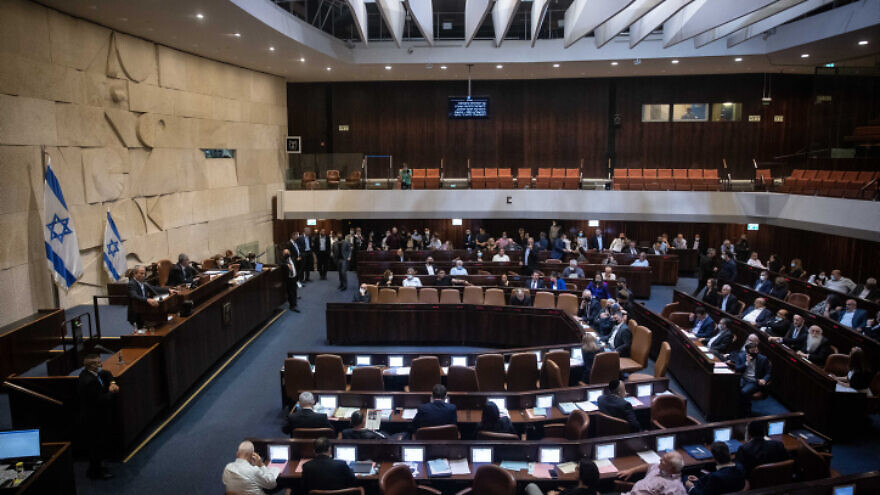The Citizenship and Entry into Israel Law has a new lease on life, passing its first reading in the Knesset on Feb. 7, the start of a lengthy legislative process. The law, which essentially prevents Palestinians from “marrying into Israel,” went down to defeat during a passionate debate in July, but has been resuscitated as center-right Knesset members from both sides of the aisle consider it essential for Israel’s security and demographic stability.
The Citizenship Law—also referred to more colloquially as the “family reunification law,” first passed in 2003 and renewed subsequently each year—is designed to stem the flow of Palestinians entering Israel through marriage, usually to Arab Israelis, after which they are eligible for Israeli citizenship or permanent residency. (According to researchers at the Jerusalem-based Kohelet Policy Forum, 65,000 Palestinians became Israeli citizens through marriage over the 25-year period between 1967 and 1993. In just 10 years, from 1993 to 2003, more than 130,000 became citizens.)
The proposed law notes that Israeli identity cards given to these naturalized citizens enable them to move freely between Israel and the Palestinian Authority, making them a “preferred population for terrorist organizations to carry out hostile activity.” Moreover, Israel’s security services say the second generation of “unified families” has been responsible for more terror than other Arab Israelis.
“The involvement of people living in Israel by virtue of family reunification [and their children] in terrorism and actions against Israel is very high, and therefore, it should be reduced,” Knesset member Simcha Rothman of the Religious Zionist Party told JNS.
The Citizenship Law regulates family reunification for people coming from the P.A., the Gaza Strip, Iran, Lebanon, Syria and Iraq.
“The law does not prevent anyone from marrying whomever he or she desires, regardless of religion, race or gender,” noted Rothman, adding that “an Arab who marries his fiancée who lives in a country that is not an enemy state can bring her to Israel. A Jewish citizen who marries a resident of the Palestinian Authority will not be able to grant her citizenship.”
Rothman played a key role in putting the law back on the agenda through his negotiations with Israeli Minister of Interior Ayelet Shaked. Shaked agreed that members of the opposition would support the government’s proposed law, and in return, government MKs would support opposition amendments to that law. Along with three amendments, the law was submitted for a vote on Monday. All passed. Of the amendments, Rothman’s is reportedly the toughest.
The central changes in Rothman’s amendment are 1) maximum quotas—it imposes a rule that Israel’s interior minister will set a maximum yearly quota of those who are eligible for Israeli citizenship from the countries and entities listed above, and; 2) transparency—it requires that the interior minister submit a monthly report of exemptions for those requesting entry for humanitarian or other reasons.
“The government version is a copy of the previous versions of the law, without changes,” explained Rothman. “The changes appear in my law, and since the government could not reach agreement on the required changes, the passage of both laws was required.”
Rothman has repeatedly warned since July that the Citizenship Law no longer worked; its effectiveness having been eroded by the granting of exemptions. The law has allowed a “creeping ‘right of return,’ ” he said, referring to the Palestinian demand that an ever-expanding number of “refugees”—5.7 million by the last count—be allowed to return to Israel, a policy that, if implemented, would wipe away Israel’s identity as a Jewish state.
‘A justification for a sweeping prohibition’
For opponents of the law, the demographic argument is proof of racism. They dismiss the issue of security, which is the only argument contained in the law itself, as a red herring and consider the law nothing more than an attempt by a majority to oppress a minority.
Naomi Chazan, professor emerita of political science at the Hebrew University of Jerusalem and a former Knesset member for the Meretz Party, said that fear of terrorism is more of an excuse for the law than its real driver, telling JNS that instead of taking a case-by-case approach, Israel is using security concerns “as a justification for a sweeping prohibition.”
“The right to raise a family is such a fundamental human right, it doesn’t need much discussion,” she said. “It’s embedded in everything from the Bible to the Universal Declaration of Human Rights.”
“There’s a double problem. There is a breach of human rights, and there’s built-in discrimination against one group of citizens because of their national origin by another group of citizens who have a majority, and anywhere else in the world historically, today when that happens people shriek gross discrimination,” she said.
“It’s one of the worst breaches of democracy I can think of,” she added.
However, Avi Bell, a law professor at Bar-Ilan University in Ramat Gan, and the University of San Diego and senior fellow at the Kohelet Policy Forum, disagreed, telling JNS: “Many democratic states refuse automatic citizenship to foreign spouses and nearly all vary immigration policy by nationality.”
“It is well-established in international law and international practice that states have near-plenary discretion in establishing their immigration policies,” he said.
“When opponents of the law claim that Israel has a human-rights duty to accept Palestinian Arab immigrants on the basis of ‘family unification,’ they are trying to impose on the Jewish state a unique ‘human rights’ limitation that is not imposed on other democratic and liberal states,” he said. “The Jewish state should not be subjected to such discriminatory standards, and it should not bow to them.”


























